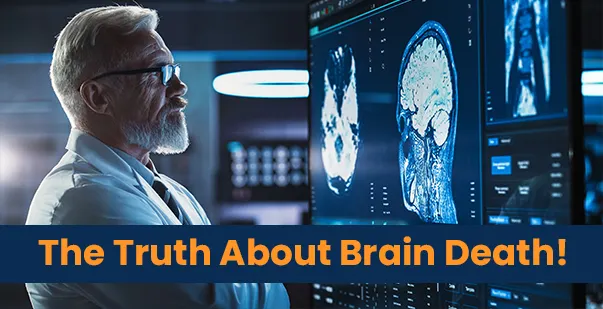When a trauma causes an irregular heartbeat, the individual can undergo a cardiac arrest. The condition disrupts the regular flow of blood in the body. Without oxygen-rich blood flowing, the brain starts to suffer almost immediately. Thus, brain damage becomes a real concern as brain cells begin dying within minutes of oxygen deprivation. That’s why CPR for brain damage is so critical. It keeps blood moving until the heart can be restarted. But how long does the brain stay active after cardiac arrest?
The answer isn’t simple. Some people make full recoveries even after prolonged cardiac arrest, while others experience severe brain damage in just a few minutes. So, read on to know how long the brain can go without oxygen, what are the symptoms of brain damage and medical interventions to minimize the damage.
Master ACLS Now
Get ACLS certified with confidence
What is Cardiac Arrest?
Cardiac arrest is a sudden, catastrophic medical emergency where the heart abruptly stops pumping blood effectively. Unlike a heart attack, which involves blocked blood flow to the heart, cardiac arrest represents a complete cessation of heart function. During this critical event, the heart’s electrical system malfunctions, causing an immediate halt in cardiac output.
The condition can occur without warning and strikes individuals across all age groups. When the heart stops, oxygen-rich blood no longer reaches vital organs, especially the brain. A person experiencing cardiac arrest collapses, becomes unresponsive, and stops breathing normally. CPR (cardiopulmonary resuscitation) becomes important in these moments. It manually pumps blood to the brain and organs, buying time until a defibrillator or medical help arrives.
Read more: An Ultimate Guide to Cardiac Conduction System
How is Brain Damage Related to Cardiac Arrest?
When the heart stops, the oxygen supply to the brain is immediately cut off. After a patient experiences cardiac arrest, brain damage begins within 3-5 minutes. Brain cells begin dying, leading to brain damage if blood flow isn’t restored quickly. The extent of damage depends on how long the brain goes without oxygen and whether CPR for brain damage or other life-saving measures is performed. Following are the key reasons why cardiac arrest causes brain damage:
The Brain’s Oxygen Dependence
The brain relies on a continuous oxygen supply to function. When cardiac arrest occurs, blood flow stops, causing a hypoxic-anoxic injury (HAI). It is a condition where brain cells suffer from partial or complete oxygen loss. While some people survive after prolonged cardiac arrest, many suffer lasting cognitive or physical impairments.
Time-Sensitive Neurological Damage
Now you may be wondering, brain damage occurs after how many minutes? Brain cells are highly sensitive to oxygen loss. Within 4-6 minutes, irreversible damage begins, which makes immediate CPR and defibrillation critical for survival. Delayed resuscitation increases the risk of anoxic brain injury. It can even impact areas responsible for movement, speech, and consciousness.
Cellular Breakdown and Toxicity
Without oxygen, brain cells switch to emergency metabolic processes. Mitochondria fail to generate energy, which leads to the accumulation of toxic byproducts. This results in cell membrane breakdown and enzyme activation. This process accelerates neuronal death, making brain function recovery more difficult.
Inflammatory Response and Secondary Damage
When blood circulation resumes, the body’s immune response can worsen brain injury. Inflammatory cells flood the brain and trigger oxidative stress, which causes further cellular destruction. This secondary damage can contribute to long-term neurological disorders, including memory loss and motor impairment.
Long-Term Neurological Effects
Even if a person survives cardiac arrest, cognitive and motor impairments may persist. Many patients experience memory deficits, reduced mental processing speed, or coordination issues. In such cases, rehabilitation and therapy are often required to restore brain function and improve quality of life.
How Long Can the Brain Stay Active After A Cardiac Arrest?
The brain relies on a continuous supply of oxygen to function, and when cardiac arrest occurs, this supply is suddenly cut off. The timeline for brain activity after the heart stops depends on how quickly brain damage is prevented by restoring blood flow. Without immediate intervention, brain cells begin dying within minutes, leading to permanent damage or death. So, when blood flow and oxygen are interrupted, how long does it take for the brain to begin to die? Let’s find out:
The Critical First Few Minutes (0-3 Minutes)
CPR should be initiated within 2 minutes of the cessation of the functioning of the heart to keep blood circulating. CPR, if conducted properly and within time, still supplies oxygen to the brain and prevents serious damage. However, if 3 minutes pass before CPR is initiated, the brain will not receive a sufficient flow of blood, which destroys brain cells. This can even result in global cerebral ischemia.
So, how long can you do CPR before brain damage? The likelihood of positive outcomes decreases with prolonged CPR. Some studies suggest that continuing CPR for 30 minutes or more can still yield favorable neurological outcomes under certain conditions, such as immediate initiation, effective chest compressions, and early defibrillation.
Severe Brain Damage Begins (4-9 Minutes)
At around 4 minutes, brain cells start to be killed, and brain function starts to be disrupted. Within 9 minutes, extensive and possibly irreversible brain damage is likely to occur. Even when the heart is restarted, issues with thinking and movement usually follow. Now, you may wonder, how long can the brain go without oxygen with CPR? The exact timeline can vary based on individual factors such as age, overall health, and the circumstances surrounding the cardiac arrest. However, the brain can only survive for 4-5 minutes without oxygen with CPR.
The 10-Minute Mark When Survival Becomes Unlikely
If the heart is not beating for 10 minutes without CPR or a defibrillator, the survival rate is greatly reduced. Most people become comatose, and brain death is a high risk. Although there are a few patients who have survived after this time with aggressive medical treatment, the chance of fully recovering their brain function is low.
Survival After Heart Stops For 20 Minutes Becomes Impossible
A common question people have is, can you survive if your heart stops for 20 minutes? The consensus among medical professionals is that survival after such an extended period without circulation is exceedingly rare and generally considered impossible. So, what happens to the brain after 20 minutes without oxygen? After 20 minutes of cardiac arrest, the brain experiences profound ischemia, leading to extensive neuronal death and irreversible brain damage.
Brain Damage Symptoms After Resuscitation
Surviving cardiac arrest does not always mean a full recovery. When the heart stops, the oxygen supply to the brain is interrupted, increasing the risk of CPR brain damage. Even with successful resuscitation, some individuals experience mild to severe neurological impairments. The extent of damage depends on how long the brain was deprived of oxygen and how quickly CPR and defibrillation were performed.
Memory Loss and Cognitive Impairments
Memory functions are among the first to be affected by brain damage after cardiac arrest. Many survivors struggle with amnesia, forgetting recent events or having difficulty retaining new information. In some cases, disorientation occurs, causing confusion about time, place, or even identity. These cognitive deficits may improve over time with therapy, but severe cases may result in permanent memory loss.
Motor and Physical Challenges
A lack of oxygen to the brain can lead to loss of muscle control, affecting coordination and movement. Some survivors experience involuntary muscle contractions (spasticity), weakness, or complete loss of mobility in certain body parts. Fine motor skills, such as writing or buttoning a shirt, may also be impaired. Incontinence is another possible consequence, requiring medical assistance for daily functions.
Speech and Communication Issues
Brain damage can interfere with speech and language processing. Survivors may struggle to form words, understand spoken language, or experience slurred speech. These symptoms can improve with speech therapy, but severe cases may lead to long-term communication difficulties.
Personality and Emotional Changes
Damage to certain areas of the brain can alter mood and personality. Some survivors become more irritable, anxious, or depressed, while others may exhibit unusual emotional responses. In extreme cases, personality changes can be drastic, affecting relationships and daily interactions.
Long-Term Outcomes and Recovery
While some symptoms improve with time and rehabilitation, others may be permanent. Survivors who suffered prolonged oxygen deprivation may require lifelong assisted care. Studies show that the chances of brain death are likely if the heart stops for more than 20 minutes without intervention. Quick CPR and access to an automated external defibrillator (AED) increase the likelihood of survival with minimal damage.
Medical Interventions to Preserve Brain Function
When the brain is deprived of oxygen during cardiac arrest, immediate medical intervention is crucial to prevent irreversible damage. Modern medicine employs several strategies to protect brain cells and enhance recovery. These interventions aim to minimize brain damage and improve neurological outcomes after resuscitation.
Therapeutic Hypothermia (Targeted Temperature Management)
Lowering body temperature after cardiac arrest helps slow brain metabolism, reducing inflammation and cellular damage. This process, known as targeted temperature management (TTM), involves cooling the body to 32-36°C (89.6-96.8°F) for 24-48 hours. It is particularly beneficial for patients who remain unconscious after resuscitation.
Controlled Reperfusion Therapy
Restoring blood flow too quickly can cause additional injury, known as reperfusion injury. Controlled reperfusion strategies, such as Controlled Automated Reperfusion of the Whole Body (CARL) and Extracorporeal Membrane Oxygenation (ECMO), regulate oxygen and blood delivery to prevent oxidative stress and inflammation. This careful reintroduction of circulation helps limit brain damage after cardiac arrest and improves the chances of recovery.
Ventilator Support and Oxygen Therapy
Mechanical ventilation ensures adequate oxygen delivery while maintaining stable blood pressure and carbon dioxide levels. Proper oxygenation is essential because too little or too much oxygen can worsen brain injury. The support also determines how long does the brain stay alive after the heart stops. Doctors carefully monitor ventilation settings to optimize oxygen flow and prevent further harm.
Neuroprotective Medications
Certain drugs are being explored for their ability to protect brain cells and reduce inflammation. Medications like sedatives, anti-seizure drugs, and antioxidants may help minimize brain damage symptoms after resuscitation. Ongoing research is focused on improving neuroprotection through targeted pharmacological interventions.
Can the Brain Recover After Prolonged Oxygen Deprivation?
The human brain has remarkable healing potential, but the extent of recovery depends on the duration of oxygen deprivation and the effectiveness of resuscitation efforts. Brain death starts to occur within the first 3-10 minutes, but some individuals have defied the odds through intensive rehabilitation and neuroplasticity.
Cases of Recovery After Extended Cardiac Arrest
Can a person survive without oxygen for 30 minutes? Usually, it is not possible, but rare cases exist where individuals have survived prolonged cardiac arrest and brain damage minutes beyond what is typically considered recoverable. A notable case involved a 40-year-old man who survived a cardiac arrest lasting approximately 3½ hours. Resuscitation efforts adhered strictly to advanced cardiac life support guidelines, and the patient achieved a good neurological outcome.
Another case detailed a patient who experienced an out-of-hospital cardiac arrest and underwent 96 minutes of sustained CPR due to recurrent ventricular fibrillation. Remarkably, the patient made a complete neurological recovery.
The Role of Neuroplasticity in Healing
Neuroplasticity refers to the brain’s ability to reorganize itself by forming new neural connections. Even after severe injury, therapy, cognitive exercises, and rehabilitation can help improve function. Younger patients generally have a higher capacity for neuroplastic recovery than older individuals.
Give Timely CPR to Prevent Brain Damage from Cardiac Arrest!
Immediate CPR for brain damage after cardiac arrest helps restore blood flow to the brain and reduces the risk of anoxic brain injury. Brain cells start dying within 4-6 minutes, so quick action is essential. Chest compressions push oxygen-rich blood through the body, delaying permanent damage until emergency care arrives.
Using an AED can restore a normal heartbeat, preventing prolonged oxygen loss. Even after revival, some patients suffer from long-term neurological effects due to oxidative stress and cell destruction. Thus, you should always stay prepared with BLS and ACLS training to attend any cardiac arrest emergency and prevent brain damage. A person’s survival often depends on how fast someone nearby reacts.
References:
https://med.nyu.edu/research/parnia-lab/cardiac-arrest-death
https://www.verywellhealth.com/brain-activity-after-cardiac-arrest-1298429







